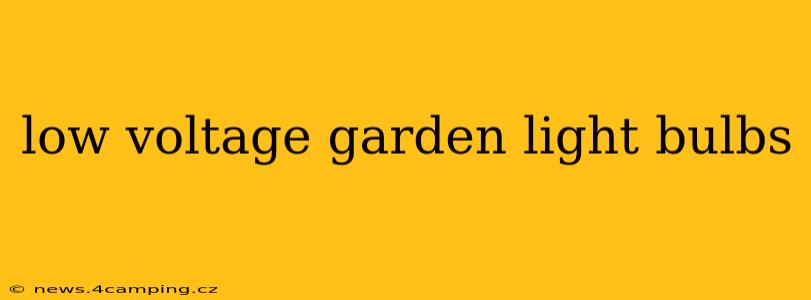Low voltage garden lighting offers a safe, energy-efficient, and stylish way to illuminate your outdoor spaces. But choosing the right bulbs can be tricky. This guide dives deep into the world of low voltage garden light bulbs, helping you select the perfect ones for your needs.
What are Low Voltage Garden Lights?
Low voltage garden lights operate on a voltage significantly lower than standard household electricity (120V or 230V). Typically, they run on 12V or 24V, making them safer to install and operate, especially in damp outdoor environments. This lower voltage reduces the risk of electric shock and allows for more flexible installation options. The lights themselves are powered by a transformer that converts higher voltage mains electricity to the lower voltage required.
What Types of Low Voltage Bulbs are Available?
Several bulb types are compatible with low voltage garden lighting systems. Each offers unique benefits and drawbacks:
Halogen Bulbs:
These bulbs produce a warm, bright light and are relatively inexpensive. However, they are less energy-efficient than LED alternatives and generate more heat. They also have a shorter lifespan than LEDs.
LED (Light Emitting Diode) Bulbs:
LEDs are the most popular choice for low voltage garden lighting. They are energy-efficient, long-lasting, and available in a wide array of colors and styles. They produce less heat than halogens, making them safer to use near plants and other flammable materials.
Incandescent Bulbs:
While less common now, some older low-voltage systems might use incandescent bulbs. These are highly inefficient and generate significant heat, making them less desirable compared to LEDs and even halogens.
What are the Benefits of Using Low Voltage Garden Light Bulbs?
Low voltage garden lighting offers many advantages:
- Safety: The lower voltage significantly reduces the risk of electric shock.
- Energy Efficiency: LEDs, in particular, consume far less energy than traditional lighting, lowering your electricity bill.
- Flexibility: Low voltage systems allow for flexible installation and placement options, enabling creative lighting designs.
- Durability: Many low voltage lights are designed to withstand the elements. LEDs, especially, boast impressive longevity.
- Aesthetic Appeal: Low voltage lights create a warm, inviting atmosphere, enhancing the beauty of your garden.
How Long Do Low Voltage Garden Light Bulbs Last?
The lifespan of a low voltage bulb depends heavily on the type of bulb used:
- Halogen: Typically lasts for 2,000-4,000 hours.
- LED: Can last for 25,000-50,000 hours or more, significantly longer than halogens and incandescents.
What is the Difference Between 12V and 24V Low Voltage Systems?
The primary difference lies in the voltage. 24V systems can transmit power over longer distances with less voltage drop than 12V systems. This makes them more suitable for larger gardens or installations with more extensive wiring. However, 12V systems are generally considered safer. The choice depends on the size and layout of your garden.
Are Low Voltage Garden Lights Expensive?
The initial cost of a low voltage lighting system, including the transformer and wiring, might be higher than traditional lighting. However, the long-term savings from energy efficiency and the extended lifespan of LEDs can offset this initial investment.
How to Choose the Right Low Voltage Garden Light Bulbs?
Choosing the right bulbs involves considering several factors:
- Brightness (Lumens): Higher lumens mean brighter light.
- Color Temperature (Kelvin): Warm white (2700-3000K) creates a cozy ambiance, while cooler white (5000-6500K) provides brighter, more natural light.
- Bulb Shape and Size: Choose bulbs compatible with your existing fixtures.
- Energy Efficiency: Opt for LEDs for maximum energy savings.
- Lifespan: LEDs offer the longest lifespan.
By carefully considering these factors, you can create a stunning and energy-efficient outdoor lighting scheme that transforms your garden into a magical space. Remember to always consult professional electricians for complex installations.
